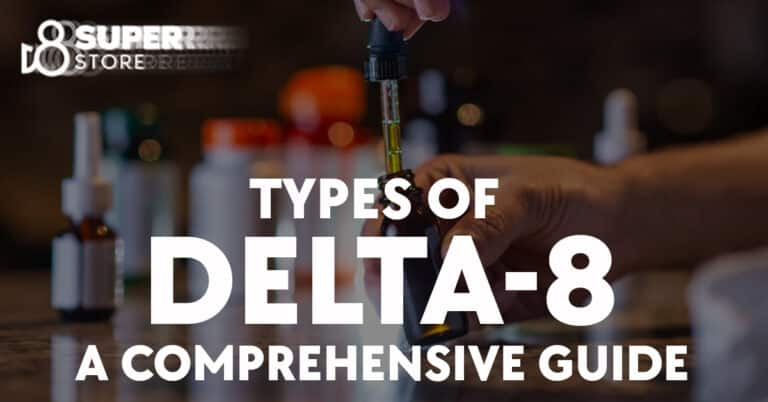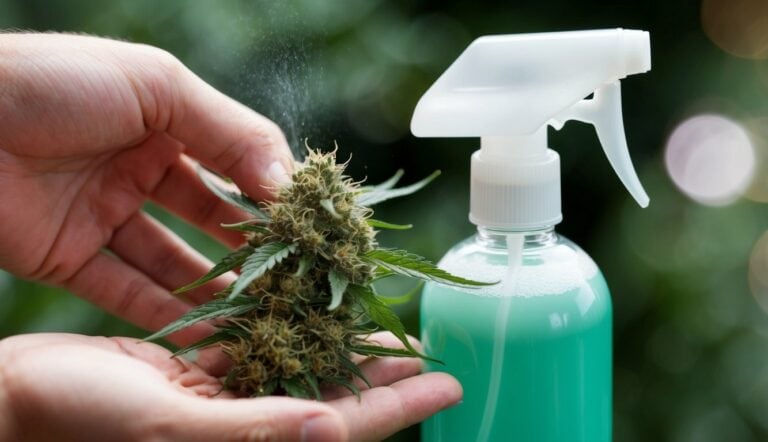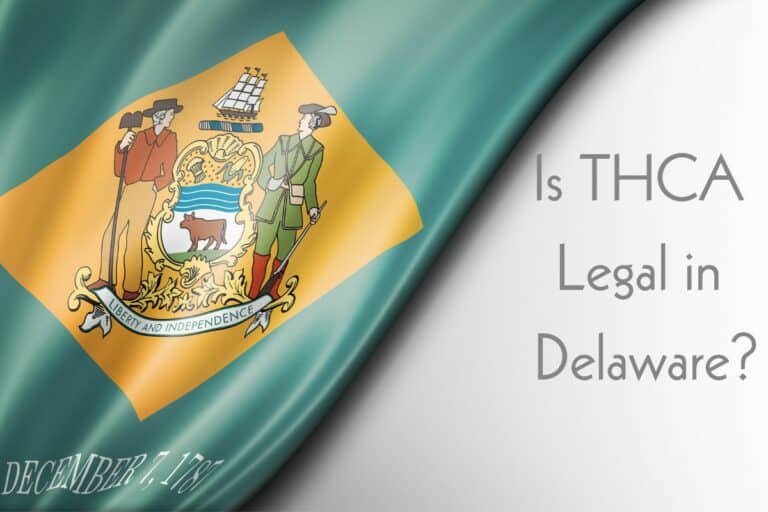Is THCa Legal in Wisconsin: Navigating State Cannabis Laws
Jumping into the world of Wisconsin’s weed regulations? Knowing your facts, especially about tetrahydrocannabinolic acid (THCa), is crucial for staying on the right side of the law. THCa turns into THC, the part that gives you a buzz. Once upon a time, Uncle Sam slammed the door shut on all types of cannabis goodies. But then came laws like the Farm Bill, changing the game and bringing hemp delights closer to our fingertips. Why stick around? You’re about to turn into a pro at weaving through these rules with ease. Keep going, because smooth waters await.
In Wisconsin, the situation reflects this changing legal environment. The legalization of industrial hemp in the state underlined a distinction between hemp, defined by its low THC content, and other forms of cannabis. While this legislative shift opened doors for industrial hemp cultivation and the production of hemp-derived products, it also spurred discussions and some confusion around compounds like THCa. Though THCa itself is not considered psychoactive, its potential to convert to THC raises questions about its legal status.
Your understanding of THCa’s legality in Wisconsin is pivotal if you’re looking to use or produce this compound. The nuances of state versus federal legislation, along with the different treatment of hemp versus marijuana, play a significant role. Moreover, scientific research on THCa continues to explore its properties and implications, which could influence future legal considerations. As laws evolve and new information comes to light, monitoring the legal context for updates is advisable to stay informed and compliant.
Overview of THCa

THCa, or tetrahydrocannabinolic acid, is a non-psychoactive cannabinoid found in cannabis plants. It serves as a precursor to THC, the well-known psychoactive component of cannabis.
Understanding THCa
Tetrahydrocannabinolic acid (THCa) is present in the raw cannabis plant. It is the acidic form of THC, but unlike THC, THCa does not produce a high because it does not easily cross the blood-brain barrier. Over time, or when exposed to heat, THCa converts to THC through a process called decarboxylation. THCa is also recognized for its potential therapeutic benefits, which are currently being studied in various scientific fields.
Chemical Structure and Properties of THCa
The chemical formula of THCa is C22H30O4. This compound belongs to the group of cannabinoids that are characterized by a closed-ring structure. THCa’s molecular structure is similar to THC, but it retains an additional carboxyl group (-COOH) that is lost when it decarboxylates to form THC.
| Property | Description |
| Molecular Formula | C22H30O4 |
| Molecular Weight | 358.48 g/mol |
| Appearance | Clear, colorless to slightly yellow resin or crystalline |
| Solubility | Insoluble in water; soluble in alcohol and other organic solvents |
This chemical structure determines its unique properties, such as its non-psychoactive status and its role as a direct precursor to THC. The potential of THCa is still under exploration, with studies investigating its possible anti-inflammatory, neuroprotective, and anti-proliferative effects.
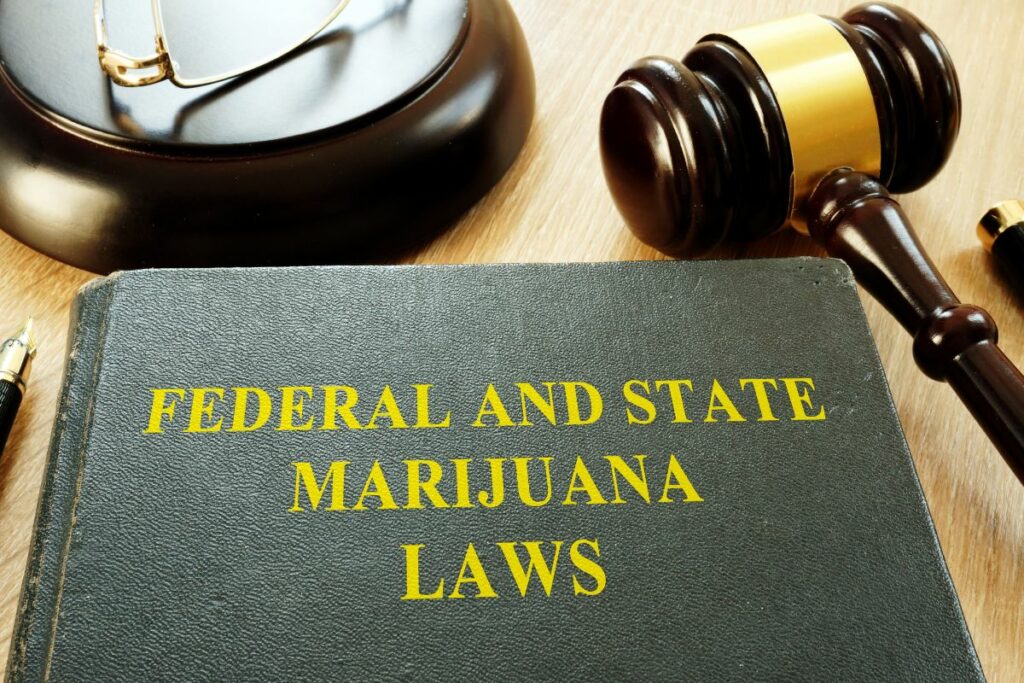
Legal Landscape
To understand the legal status of THCa in Wisconsin, you need to be aware of the complex interplay between federal and state laws, as well as how these laws compare with regulations in other states.
Federal Law and THCa
Federal law classifies Delta-9-tetrahydrocannabinol (THC) as a Schedule I controlled substance, but does not explicitly address THCa, its non-psychoactive precursor. However, under the 2018 Farm Bill, hemp and its derivatives with less than 0.3% THC on a dry weight basis are legal. THCa that converts to THC could potentially fall under this provision if the resulting THC level exceeds the legal threshold.
Wisconsin State Regulations
In Wisconsin, the legal landscape for cannabis and its compounds is more restrictive compared to some other states. While Wisconsin follows federal law per the 2018 Farm Bill, cannabis remains a controlled substance in the state. As for THCa, since it is not psychoactive, it is not regulated in the same manner as THC, but if heated and converted into THC, it might be subject to state control if the final product contains more than 0.3% THC.
Comparison with Other States
The legal status of THCa varies significantly across the United States. While California, Colorado, and Michigan have enacted laws that legalize cannabis for both medical and recreational use, which would include THCa, other states like Texas, Alabama, and Idaho maintain stringent cannabis laws. States like Minnesota and Rhode Island have medical cannabis programs which should generally permit THCa under certain conditions, whereas Florida, North Carolina, and New Mexico have more restrictive medical programs that might not recognize THCa. It is important to consult specific state legislation for accurate information, as some states like Arkansas, Oregon, Kansas, Georgia, Indiana, and Michigan have unique provisions which could impact the legal status of THCa.
THCa vs. THC: Legal Considerations
| Aspect | THCa (Tetrahydrocannabinolic Acid) | THC (Tetrahydrocannabinol) |
|---|---|---|
| Chemical Nature | Precursor to THC; Found in raw, unheated cannabis | Psychoactive compound; Formed through decarboxylation |
| Psychoactive Effects | Non-psychoactive | Psychoactive (causes the “high” associated with cannabis) |
| Legal Status | Often not regulated or prohibited | Subject to various legal restrictions based on jurisdiction |
| Medical Use | Limited medical research on THCa; non-psychoactive | Used for various medical conditions in some jurisdictions |
| Recreational Use | Generally not used recreationally in its raw form | Recreational use subject to local laws and regulations |
| Legal Limits | Not commonly regulated for THCa alone | THC concentration limits may be imposed for cannabis products |
| Derivatives/Products | Found in raw cannabis; Limited THCa-specific products | Various THC-containing products available, subject to regulations |
| Considerations | THCa itself may not have legal implications; Considerations often tied to overall cannabis regulations | Legal status varies widely; Check local laws for possession, sale, and use |
| Evolution of Laws | Laws may evolve as research on cannabinoids progresses | Cannabis laws are dynamic and subject to change; Stay informed |
When exploring the legality of cannabis compounds in Wisconsin, you need to recognize the distinct legal treatments of tetrahydrocannabinolic acid (THCa) and delta-9 tetrahydrocannabinol (THC).
Understanding the Legal Distinctions
THCa is a non-psychoactive precursor to THC found in the raw cannabis plant. It does not produce the “high” associated with THC until it is decarboxylated, typically through heat. In legal terms, the differentiation between THCa and federally illegal psychoactive THC is significant. Under the Controlled Substances Act, THC is listed as a Schedule I substance, but this does not include all THC isomers and analogs. Wisconsin follows federal guidelines that permit hemp-derived cannabinoids, including THCa, as long as the delta-9 THC concentration does not exceed the federal limit of 0.3% on a dry weight basis.
Delta-9 THC and Federal Guidelines
The 2018 Farm Bill federally legalized hemp and hemp-derived compounds, defining legal hemp as having a delta-9 THC concentration of 0.3% or less. Consequently, THCa present in hemp is legal so long as the plant meets this criterion. However, should THCa convert into delta-9 THC during processing and cause the total THC content to surpass the legal threshold, the resultant product would be considered a controlled substance. In Wisconsin, the state adheres to these federal regulations, meaning products containing THCa are lawful provided they do not inherently lead to illegal levels of psychoactive THC.
Usage of THCa in Wisconsin
When exploring the landscape of tetrahydrocannabinolic acid (THCa) in Wisconsin, it’s essential to distinguish between its medical and recreational uses. Here, you’ll find structured insights into how the compound is utilized and regulated within the state boundaries, particularly focusing on THCa flower, hemp-derived THCa, and relevant possession laws.
Medical Usage
In Wisconsin, the use of THCa for medical purposes is tightly regulated. If you have a qualifying condition, you might be allowed access to low-THC cannabidiol (CBD) products under the state’s limited medical cannabis law. However, the distribution and possession of hemp-derived THCa for medical use specifically are not widely established and remain a complex issue due to legislative intricacies.
Recreational Usage
Recreational use of THCa or any THC-related compounds, including smokable flower, remains illegal in Wisconsin. Personal use and possession are prohibited, and there are no regulations in place that allow the recreational consumption of THCa. It’s critical to be aware that despite hemp-derived products being legal at the federal level, this does not include all forms of THCa for recreational use in the state.
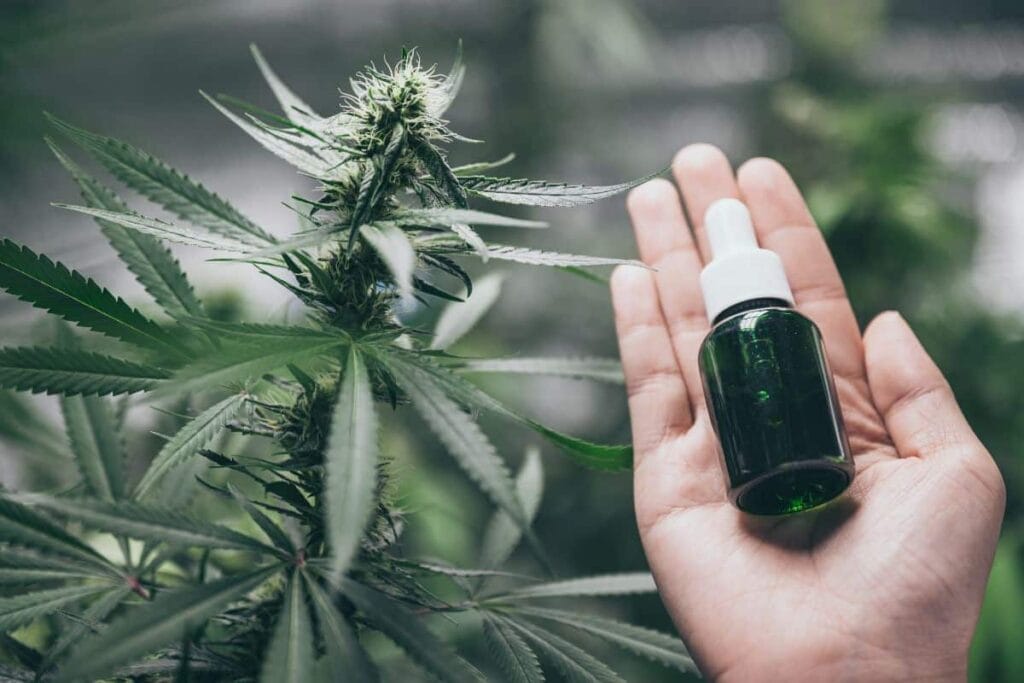
Hemp-Derived Products and THCa
Understanding the nuances of hemp-derived cannabinoids and their legality, specifically THCa, is crucial for both consumers and producers. In Wisconsin, the legal landscape surrounding hemp and its derivatives can influence the cultivation, production, and sale of these products.
Understanding Hemp-derived THCa
Tetrahydrocannabinolic acid (THCa) is a non-psychoactive cannabinoid found in the resin glands of the hemp plant. When THCa is exposed to heat, it converts to tetrahydrocannabinol (THC), the compound known for its psychoactive effects. You might be familiar with this process as decarboxylation. Hemp-derived THCa exists primarily in raw and unprocessed forms of hemp, like leaves and flowers.
| Cannabinoid | Properties | Occurrence |
| THCa | Non-psychoactive precursor | Raw and unprocessed hemp |
| THC | Psychoactive after heat | Processed or heated hemp |
In the context of industrial hemp, which is legally defined as a cannabis plant with a THC concentration of not more than 0.3 percent on a dry weight basis, hemp-derived products typically contain THCa levels consistent with these legal limits.
Legal Status of Hemp-derived Products
The legal status of hemp-derived products varies depending on their THC content post-decarboxylation. Under the 2018 Farm Bill, industrial hemp was federally descheduled as a controlled substance, thereby legalizing hemp and hemp-derived products with less than 0.3% THC content. While this implies a federal permission for hemp-derived THCa, your state’s laws are pivotal.
In Wisconsin, hemp farming is permitted, and hemp-derived products are legal as long as they adhere to the THC threshold. It is important for you to know that while THCa itself is not psychoactive, its potential to convert into THC could impact the legal standing of the hemp-derived product in question. It’s advised to stay informed about any changes in state-specific regulations regarding hemp-derived cannabinoids, including THCa.
For comprehensive information on the topic of cannabis and hemp products in Wisconsin, including hemp-derived THCa, you may look at the following resources: Hemp growing pains and Potency and safety analysis of hemp delta-9 products, which delve into the nuances of cultivation and legal status.
Consumer Considerations
When considering the purchase and use of THCa products in Wisconsin, you should be aware of the legal landscape and the importance of safety measures. It’s essential to understand where and how to safely purchase these products as well as the precautions necessary to use them responsibly.
Purchasing THCa Products
To buy THCa products such as tinctures, edibles, or concentrates in Wisconsin, online dispensaries and local CBD product retailers are your likely destinations. Ensure that any THCa extract, capsules, or topicals you consider purchasing is accompanied by a lab report confirming its legality and composition. Wisconsin law permits the sale of CBD products; however, the legal status of THCa may differ, as laws continuously evolve.
- Online: When purchasing THCa products online,
- Verify the retailer’s reputation and legal compliance.
- Look for clear product labeling and lab reports.
- Dispensaries: If buying from a dispensary,
- Ask about the source and quality of the product.
- Confirm that the product meets local THC content regulations.
Safety and Precautions
Your safety is paramount when using THCa products. Always start with low doses, especially if you are new to THCa or any related cannabis-derived products. Precautions should include:
- Safety Measures:
- Check for a lab report to confirm the product’s THC level does not exceed legal limits.
- Understand the potential effects and proper dosing of THCa.
- Use Precautions:
- Avoid driving or operating heavy machinery after use.
- Store products out of reach of children and pets.
Your awareness and adherence to these guidelines will help ensure a safe and legal experience with THCa in Wisconsin.
Potential Benefits and Effects
When exploring the realm of cannabinoids, especially THCa, you’ll find an array of potential benefits stemming from its interaction with your body’s endocannabinoid system without the intoxication associated with THC.
Therapeutic Benefits of THCa
Tetrahydrocannabinolic acid (THCa), a non-psychoactive precursor of THC found in raw and live cannabis, may offer you therapeutic benefits. Research indicates that THCa has anti-inflammatory and neuroprotective qualities. It could help in the management of symptoms such as pain and muscle spasms. Additionally, there is evidence suggesting that THCa may have a role in cancer cell apoptosis, which is the process of programmed cell death, a vital component in stopping the proliferation of cancer cells.
Interaction with Endocannabinoid System
Your endocannabinoid system consists of cannabinoid receptors, such as CB1 and CB2, which are found throughout your body. THCa binds to these receptors, contributing to its non-intoxicating effects. While THCa does not have the psychoactive effects that THC does, its interaction with CB1 and CB2 receptors may still play a significant role in the potential therapeutic effects of cannabis. THCa’s influence on both CB1 and CB2 receptors might explain some of its non-psychoactive results, such as the suppression of inflammatory processes and the potential to alleviate some symptoms.
Frequently Asked Questions
Navigating the intricacies of THCa legality in Wisconsin can be complex. This section provides clarity by addressing frequently asked questions on the subject.
What is the legal status of THCa in Wisconsin?
THCa is classified differently from its psychoactive counterpart, delta-9 THC. In Wisconsin, substances are regulated based on their psychoactivity. Since THCa is non-psychoactive in its raw form, its legal status may differ from THC. However, specific state legislation should be consulted for current details.
Can you possess THCa without penalty in Wisconsin?
Possession of THCa may not incur traditional penalties associated with cannabis products because it is non-psychoactive. However, Wisconsin’s laws regarding cannabinoids are strict, and the final legal stance can depend on interpretation by law enforcement and courts.
Are there any specific regulations surrounding THCa in Wisconsin?
Wisconsin may have distinct laws pertaining to cannabinoids, and while THCa is different from THC, regulations may still apply. It is crucial to investigate current state laws as they can be subject to change and may affect THCa differently.
How does Wisconsin law differentiate between THCa and Delta 9 THC?
Wisconsin law treats Delta 9 THC as a controlled substance due to its psychoactive properties. In contrast, THCa’s lack of psychoactivity in its natural state often leads to a separate legal categorization. Nonetheless, conversion to THC upon heating could alter its legal status.
What are the potential legal repercussions of possessing THCa in Wisconsin?
While legal repercussions for possessing a non-psychoactive substance like THCa are typically less severe than those for THC, ambiguities in the law mean potential risks still exist. Consulting with a legal expert on this matter is recommended due to possible changes and interpretations of state legislation.
In comparison to other states, where does Wisconsin stand on the legality of THCa?
Compared to states with permissive cannabis laws, Wisconsin has historically maintained more restrictive rules regarding cannabis-derived products. The state’s stance on THCa is similarly cautious when compared to regions with more liberal approaches to cannabis regulation.


